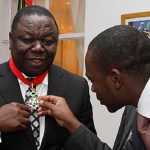 On 25 January, exactly two years and three days after Zimbabwe’s main opposition party the Citizens Coalition for Change (CCC) was launched, its leader Nelson Chamisa quit, leaving the party in turmoil.
On 25 January, exactly two years and three days after Zimbabwe’s main opposition party the Citizens Coalition for Change (CCC) was launched, its leader Nelson Chamisa quit, leaving the party in turmoil.
In a 13-page statement, the 46-year-old lawyer and clergyman listed a litany of reasons why he was taking the extraordinary step of abandoning the party he and others formed in 2022. His main gripe was what he called “infiltration” by the ruling Zimbabwe African National Union-Patriotic Front (ZANU-PF).
The opposition leader, who is expected to form a new party sometime soon, said he would not “swim in a river with hungry crocodiles”, in reference to CCC members he accuses of being sellouts working for the ruling party.
But Harare-based analyst Alexander Rusero says Chamisa bailed because he had lost control of the party.
“You don’t run away from a movement that you are leading because of infiltration; if you are in control, you purge the infiltrators,” Rusero told Al Jazeera. He added that infiltration is par for the course for political parties, and Chamisa needs to learn to live with it if he wants to continue in politics.
Divisions and tussles in Zimbabwe’s opposition are nothing new.
In 2018, longtime opposition leader Morgan Tsvangirai, founding president of the Movement for Democratic Change (MDC), died.
Chamisa claims Tsvangirai appointed him as acting leader of the country’s then-largest opposition before passing away. So he proclaimed himself party leader at the late Tsvangirai’s burial, ran under the MDC banner in 2018 for president, and came second to incumbent Mnangagwa.
However, the leadership battle spilled into court, which ruled that Chamisa’s leadership of the MDC was unconstitutional, and Thokozani Khupe, Tsvangirai’s deputy, was the rightful successor. That led to Chamisa forming the CCC in 2022, with some of those who broke away from the MDC joining.
Chamisa losing his grip on the CCC leadership became evident only weeks after last August’s elections, when the party won more than 100 of the 280 seats in the Parliament of Zimbabwe, denying the ruling party a two-thirds majority that could allow it to change the Constitution.
Sengezo Tshabangu, who claimed to be the party’s interim secretary-general, started recalling MPs and councillors, saying they were no longer CCC members. Under Zimbabwe’s constitution, an MP who ceases to be a member of the party under which he or she got elected has to vacate the seat, thus triggering a by-election.
Tshabangu wrote to the speaker of Parliament advising him to recall the MPs. The CCC labelled him an impostor and a proxy of the ruling party, but its request to ignore the recall letter was denied.
Continued next page
(129 VIEWS)

